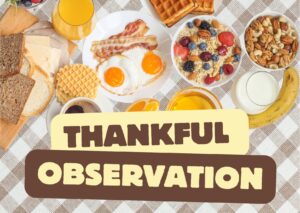
Generous

In yesterday’s lesson, I brought up the characters from the classic novella by Charles Dickens,
Read more...
The Most Wonderful Time of the Year

Four-years-old. Perhaps it is because he is my youngest.
Read more...
Thankful Observation

There was a morning breakfast buffet on our weekend away at the ministry retreat.
Read more...








